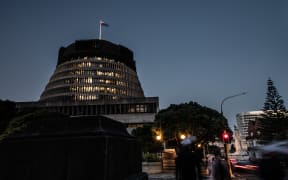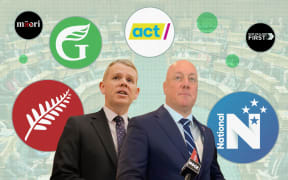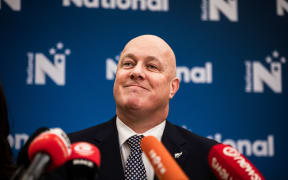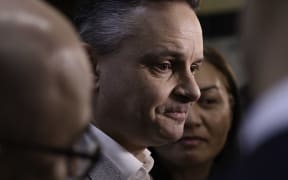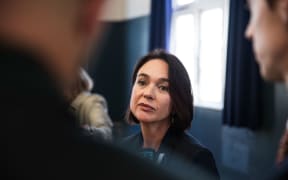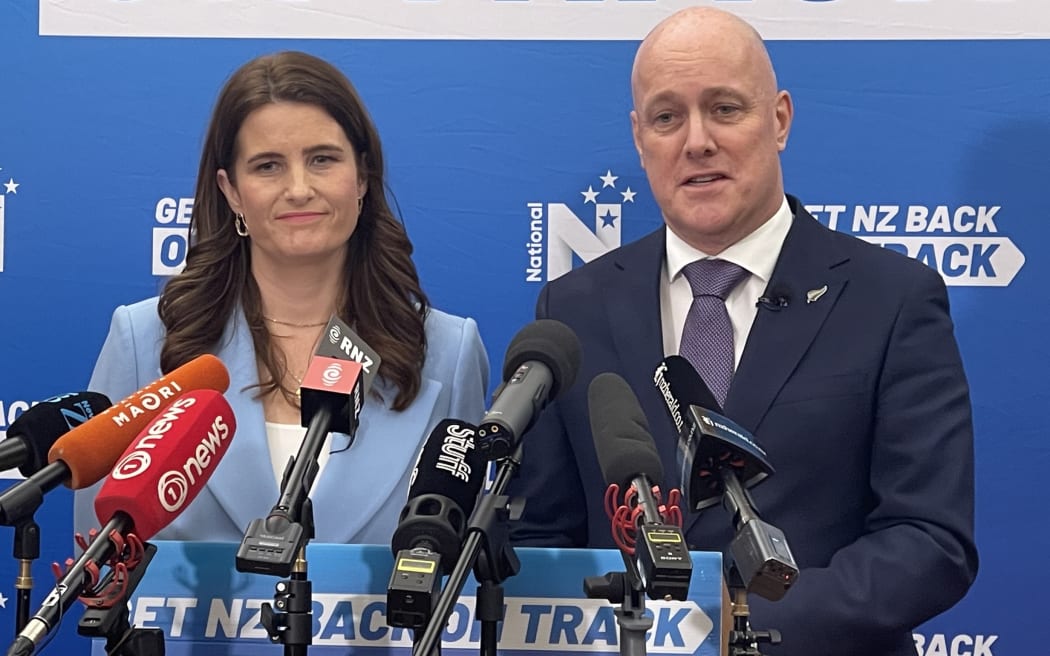
National's Christopher Luxon and Nicola Willis announce the party's tax policy. Photo: RNZ / Katie Scotcher
Analysis - National revealed an enticing tax policy this week, aimed straight at what it calls "the squeezed middle".
That's middle New Zealand, where the most votes are, that big slice of the pie that the main parties need to win an election.
The headline figures in National's "Back Pocket Boost" package, taken from its media statement, are impressive:
"Up to $250 more a fortnight for an average income family with children, up to $100 more a fortnight for an average income household with no children, up to $20 more a fortnight for a full-time minimum-wage earner, and up to $26 more a fortnight for a superannuitant couple."
Note the "up to" factor in those figures, which are not as simple as they seem. For example, the big $250 a fortnight comes mostly from previously announced childcare support.
All the details are in RNZ's 'What you need to know' report and political editor Jane Patterson takes it apart in her 'Power Play'.
"On the face of it, many New Zealanders, particularly families and households earning around the $120,000 mark, could benefit substantially," she said.
"However, dig a little deeper and there are some fishhooks that may take off some of the gloss - namely scrapping half price and free public transport and little extra direct support for low income families."
She draws attention to a significant change not highlighted in the presentation - the removal of all public transport subsidies.
"If a family relies on the bus and has a couple of kids travelling to school and back, those extra costs would eat into any tax relief delivered through threshold changes, and low income whānau would be particularly hard hit," Patterson said.
People are going to have to work out how much they'll get from National because the package includes several different measures.
"The tax cuts themselves don't deliver significant savings," Patterson said.
"The Independent Earner Tax Credit, Working for Families and its proposed childcare rebate are used to target resources at those average income New Zealanders, and it sounds better when all added up."
Stuff's political editor Luke Malpass was underwhelmed.
"It's taken 18 months and a whole load of work since the initial iteration was announced, but National's tax cut package is pretty thin sauce," he said.
"It is designed to give a little bit to everyone but hand the maximum possible out to swing voters."
Malpass said it wasn't really just about tax cuts, it was about using the existing system to leave more cash in the pockets of average earning households with the effect being they would vote National.
"Politically, it looks like a bit of a complicated sell," he said.
"The headline figures look good but when out on the hustings, if people are asking Christopher Luxon or Nicola Willis how much money they might get, the answers could get a bit contorted depending on income, children, working for families and so on."
Columnist Matthew Hooton, writing in the Herald, was scathing.
"National's tax policy was much worse than expected," he said.
"It reveals a party undeserving of being taken seriously. It has no plan to 'fix the economy', nor any idea of what one might look like. It seems uninterested in achieving power to avert economic disaster, and content to merely hold office."
Hooton said National was facing "probably the most incompetent government in New Zealand's history" and, with its allies, should be at least 10 points ahead in the polls.
"Instead, National and ACT are roughly equal to Labour, the Greens and Te Pāti Māori, with New Zealand First set to be kingmaker, whatever anyone says before the election."
The Herald's political editor, Claire Trevett, said National's approach highlighted the ideological differences between the main parties.
"You can take the money (National's tax cuts) or the bag (Labour's more convoluted approach of subsidies and targeting)," she said.
"They are playing to different audiences. Labour has been playing to the lower to middle income households - especially those with families.
"National's 'squeezed middle' plays to an audience who feels they have missed out so far in the targeted cost of living incentives put up by Labour."
Trevett didn't think voters would worry much about the cost of National's package.
"It is betting the arguments about whether or not it is affordable will be white noise and those voters will take the money instead of the bag."
Stuff's money editor Susan Edmunds took on the task of working out the difference between National's package and Labour's numerous cost of living support measures, among them taking GST of fruit and vegetables and offering childcare subsidies for two year olds.
"Most households would be better off under National's plan to cut taxes and boost support for families - except those who have two-year-old children, analysis shows," she reported.
It's complicated, and Edmunds used an analysis by Brad Olsen, principal economist at Infometrics:
His figures showed a family with three children and two parents earning a combined $92,966.80 a year would be $30 a week better off under Labour, if they had no two-year-olds, and $163.20 if one of their children was two.
Under National, they would be $117.54 a week better off.
Other examples were given in the report.
National put the cost of its package at $14.6 billion, a figure which most voters probably won't pay much attention to because they'll be much more interested in what they're getting out of it.
It would be paid for by public service cuts and new taxes on foreign house buyers, offshore-based online gambling and an immigration visa levy, excluding tourists.
Labour called the whole thing "voodoo economics" and there's going to be endless squabbles on the campaign trail over that.
Willis, National's shadow finance minister, knows what's coming.
"Labour will be out there telling New Zealanders that the only way they can get income relief is by slashing health and education spending. That is not true," she said.
National has vowed to increase spending on those sectors each year it is in office.
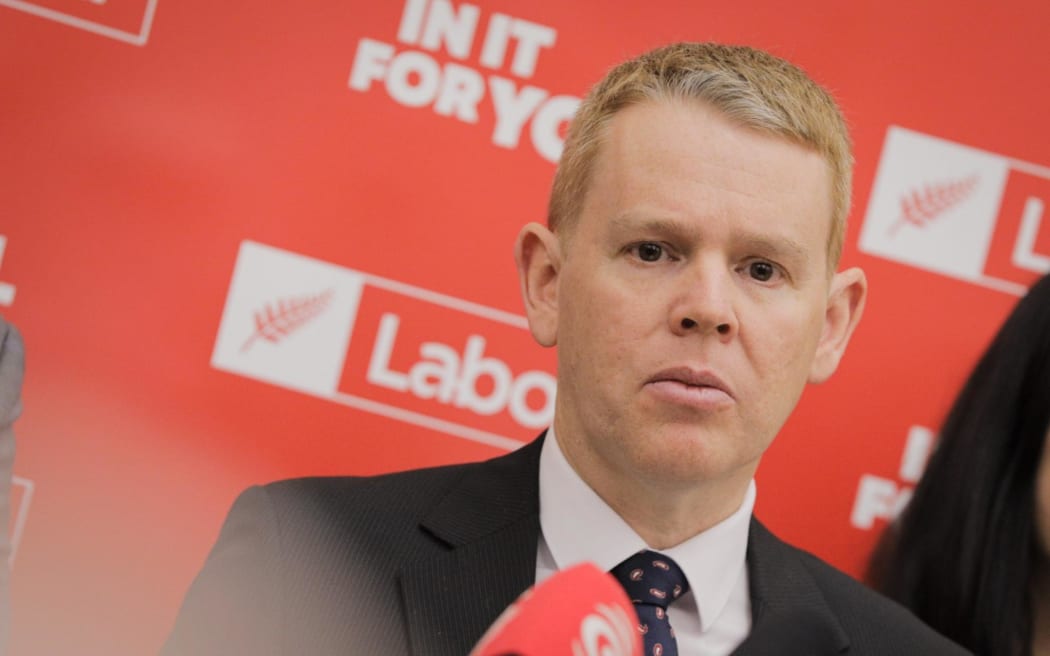
Labour leader Chris Hipkins. Photo: RNZ / Angus Dreaver
Hipkins rules out NZ First
Before National announced its tax package, the first big story of the week was Labour leader Chris Hipkins ruling out working with National, ACT or NZ First after the election.
That seemed odd, given there's no possibility of Labour working with National or ACT and NZ First leader Winston Peters has ruled out working with Labour.
There was a strategy behind it, however, and the Herald thought it was important enough to run the story as a front page lead.
"Prime Minister Chris Hipkins has thrown down the gauntlet to his rival Christopher Luxon," Thomas Coughlan's report said.
"Hipkins' gambit was more directed at Luxon, who has not ruled out working with Peters.
"Luxon's voice is the one that matters on the issue, because unlike Hipkins and Labour, Luxon and National still have a chance of going into government with NZ First after the election."
Coughlan pointed out that National's likely coalition partner, ACT, had said it wouldn't sit round the cabinet table with NZ First but had not said it would withhold confidence from a National-NZ First government, which left some form of governing arrangement on the table.
Luxon has refused to say whether he would work with Peters, and has sometimes appeared irritated by persistent media questioning.
Hipkins was very likely aiming to make Luxon's life even more uncomfortable, leaving National's leader the only one who won't come clean on which party he will or won't work with post-election.
Luxon's answer has always been that it's a "hypothetical" question because NZ First isn't in Parliament. It is, however, edging towards the 5 percent threshold and the closer it gets the more pressure will go on Luxon.
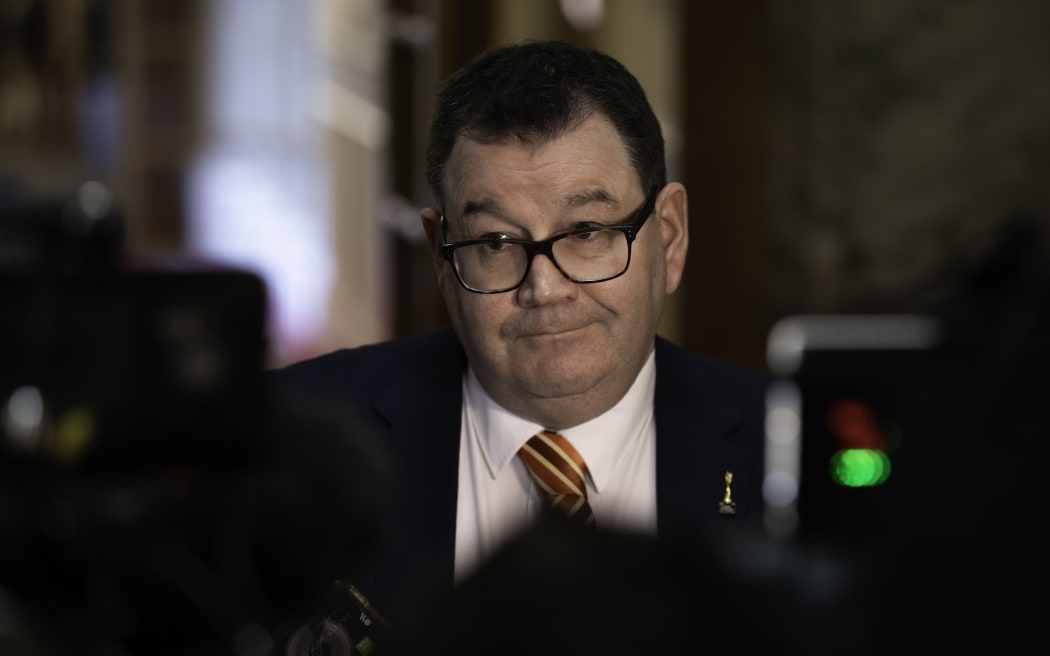
Finance Minister Grant Robertson. Photo: RNZ / Angus Dreaver
Government announces savings
The second big story was the government's announcement that it was cutting spending by $4b, on top of the $4b savings in the May Budget.
It was a sure sign there's going to be bad news in the pre-election Fiscal Update, and Finance Minister Grant Robertson was getting in with a pre-emptive strike.
Government departments, apart from those delivering frontline services, have been told to trim their budgets and many of the existing staff vacancies are unlikely to be filled.
There's a clampdown on spending on contractors and consultants - something National has been hammering on about - and the operating allowance for the 2025 and 2026 budgets has been trimmed.
Hipkins and Robertson took the podium at Monday's post-cabinet press conference to make the announcement.
Robertson said although government spending was in line with Treasury forecasts, the accounts up to May showed tax revenue was more than $2b behind.
He spent some time talking about how the global economy was deteriorating, particularly China's, and how that was impacting on New Zealand.
Robertson said the timing was simply because the government was dealing with a situation in front of it, but Willis didn't buy that.
"After six years of spending New Zealanders' money with reckless abandon, he's now finally admitted he has a problem - six weeks out from an election," she said.
National candidates
Since National released its list of candidates, not much attention has been paid to what the new caucus is going to look like.
Stuff's Andrea Vance has paid attention, and had an interesting take on it.
It would likely swell by at least a third, she said, which meant Luxon would have a much bigger team to manage.
"Based on an analysis of the party's list, released last weekend, this incoming crop brings an added risk: a large, socially conservative faction of a size not seen in the National Party since the mid-1980s," she said.
"The 'Taliban' - as the existing group is known to centrist MPs - is set to grow to as many as 18 or 19 MPs ... they are either evangelical Christians - like Luxon himself - or with morally traditional views."
Vance said if National wins in October "an unruly rump of zealots championing Christian identity politics is a significant risk to National's Cohesiveness and its ability to hold that power".
Parliament's last sitting day was Thursday, it has risen for the election.
The traditional adjournment debate "seemed to confirm the coming election will be full of negative campaigning", RNZ reported.
It did indeed. Hipkins and Luxon went head to head and anyone listening could choose to believe New Zealand was a success story or an economic train wreck.
*Peter Wilson is a life member of Parliament's press gallery, 22 years as NZPA's political editor and seven as parliamentary bureau chief for NZ Newswire

